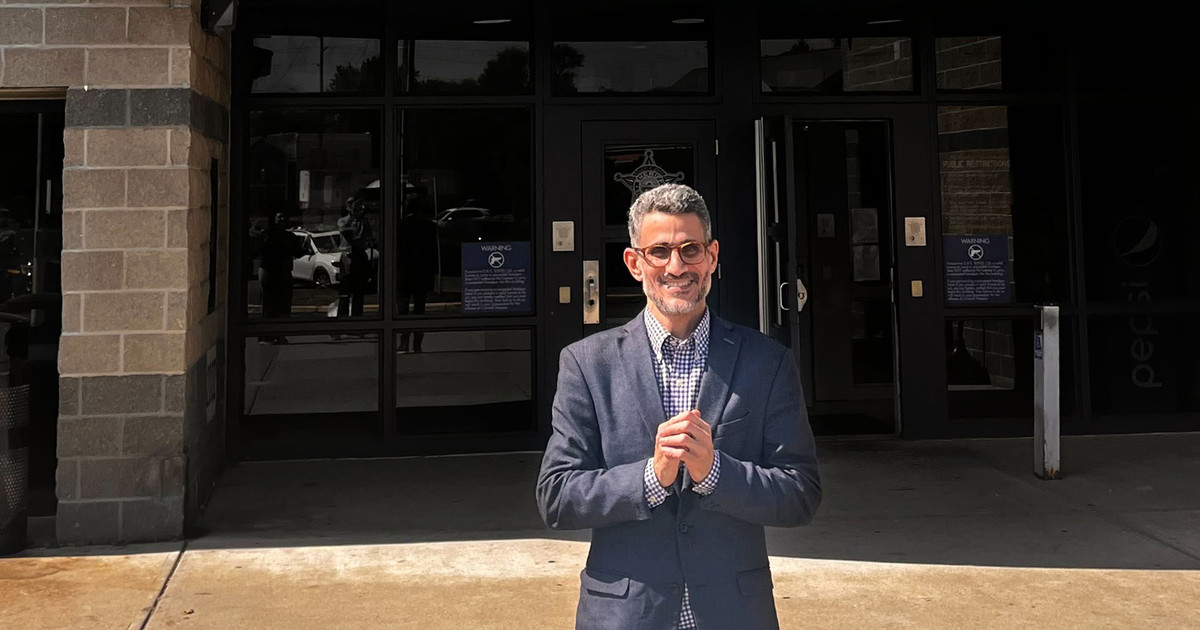
An Egyptian chaplain whose detention ignited widespread community support and sparked a critical examination of counterterrorism measures in immigration courts has been released from an Ohio jail. Ayman Soliman, 51, walked free on Friday after the Department of Homeland Security (DHS) unexpectedly withdrew its deportation case against him.
This development marks a significant victory for Soliman, a well-respected Muslim cleric with a strong following, including families he has counseled at Cincinnati Children’s Hospital. The DHS’s decision to restore his asylum status and end deportation proceedings follows mounting evidence that raised serious questions about the credibility of the government’s claims that he was involved in terrorist activities.
Just before 1 p.m. on Friday, Soliman exited Butler County Jail, beaming as he held a plastic bag containing his personal items—a moment that was joyfully captured by friends and supporters. He had been slated for an immigration trial the following week, facing the prospect of being sent back to Egypt, which he fled in 2014 due to political persecution.
“This is beyond my dreams,” Soliman expressed in a phone call with ProPublica shortly after his release. “I’m still overwhelmed by the surprise.”
His asylum status has been reinstated, and his application for a green card is back on track, according to Robert Ratliff, one of Soliman’s attorneys. Earlier on Friday, Ratliff submitted legal documents that highlighted discrepancies in the government’s allegations against Soliman. In one instance, two versions of asylum termination notices were issued, with one labeling him as a “member” of a terrorist group and the other accusing him of providing illegal assistance to such a group—claims Soliman has adamantly denied.
“The entire process has been flawed from the start,” Ratliff remarked. “This is a monumental victory for him, but it’s unfortunate he had to endure nearly 70 days in jail to achieve it.”
Though the DHS officially declined to discuss specific details of Soliman’s case, a spokesperson reiterated that individuals, even those with pending applications or lawful status, are not immune from immigration enforcement actions.
Following his release, Soliman participated in communal prayers at a local mosque, where an imam celebrated his newfound freedom, emphasizing that he is “a free man, as he always should be.”
At a news conference later that evening, flanked by his supporters, Soliman expressed his disbelief that the day began with him in custody. He described enjoying a meal of “salad and fruit and meat” after weeks of eating jail food and expressed heartfelt gratitude for the overwhelming support he received during his ordeal, including 760 letters from strangers.
“I’m free today because of this advocacy,” Soliman stated. “Don’t underestimate your voice.”
Soliman’s case highlights the complexities of immigration and counterterrorism policies, particularly during the Trump administration. After fleeing Egypt due to persecution linked to his journalistic and protest activities, he was granted asylum in 2018. However, in the final month of Biden’s presidency, immigration authorities moved to revoke his status, citing questionable claims of fraud and links to terrorism. Following Trump’s return to office, the government escalated its allegations against Soliman, formalizing his asylum termination in June.
The DHS’s case rested on allegations that Soliman’s association with an Islamic charity constituted illegal support to the Muslim Brotherhood, a group not designated as a terrorist organization by the U.S. government. An Egyptian court also found no official ties between the charity and the Brotherhood.
Material support laws, which prohibit almost any assistance to U.S.-designated foreign terrorist organizations, have been criticized by civil liberties advocates for their potential for overreach. The Biden-era DHS initially flagged the charity issue but indicated it would only revoke Soliman’s asylum if a preponderance of evidence supported the termination after a hearing. Subsequently, the government’s claims expanded under the Trump administration, with authorities labeling the Muslim Brotherhood a Tier III, or undesignated, terrorist group and making new assertions linking Soliman to Hamas.
Throughout the proceedings, the evidence against Soliman began to unravel. Legal filings revealed that DHS attorneys had introduced, withdrawn, or amended evidence intended to establish a connection between Soliman and the Brotherhood, leading to significant inconsistencies in the government’s case.
Legal experts specializing in national security have been closely monitoring Soliman’s case as a barometer of the Trump administration’s potential power at the intersection of counterterrorism and immigration policy.
Although the outcome of Soliman’s case is a triumph, Ratliff expressed concern that it may not deter the DHS from invoking similar arguments in other immigration cases, especially those involving designated terrorist organizations. “The connections in this case were always going to be too tenuous to withstand scrutiny,” he noted, indicating that similar tactics may still be employed in future cases.
Supporters from various backgrounds, including religious leaders, university students, and parents he met while volunteering, welcomed Soliman’s release. Lynn Tramonte, executive director of the Ohio Immigrant Alliance, one of the advocacy groups that fought for him, affirmed, “I know tomorrow he’ll get right back to the work he does, caring for his community.”


